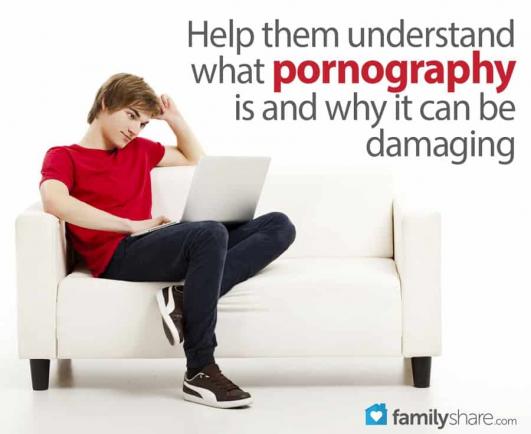
The average age of a child's first exposure to pornography is 9 years old. Virtually all teens 17 years old and older have been exposed to hard core pornography. If you have a child older than 9 years old, you need to be having regular discussions with him or her about their inevitable exposure to pornography and how to process and respond to this exposure.
Begin Early
First, if you have discovered your child or teen accessing pornography, be very thankful that you discovered this problem so that it doesn't remain in secrecy and shame, where it grows and becomes stronger. Like drug and alcohol use, pornography use is very addicting. This problem can escalate out of control, so finding out your child or teen is accessing pornography can help you be proactive in preventing a life time of addiction.
Set up External Monitors
Starting in grade school, kids start trading information about sex and pornography. Virtually all teens over the age of 17 have been exposed to hard core pornography -� either by accident or deliberately. There needs to be external monitors (filters, rules, follow-up conversations) in place which limit the likelihood your child will be exposed to pornography, either accidently or deliberately. In addition, your child needs to have a personal internal monitoring system in space, which has been built through regular talks, discussions and sharing information.
Hold Family Councils
Some families hold a monthly "Warrior Council"� where family members share things they have seen related to bullying, vicious gossip, pornography, and dishonest or cruel behavior in others. Parents and children share experiences and then brainstorm about ways to respond to these things. Parents can also share news articles which show the consequences of immoral behavior.
What To Do if You Catch Your Child Viewing Pornography
First and foremost, do not over-react. If your response is full of anger, fear and/or shame, it will very likely shut down any opportunity for honest discussion, teaching opportunities and actual behavior change in your child. Discovering this behavior is a red flag for you, as a parent, that indicates you need to be having regular discussions with your child about healthy sexuality and its false counter-part, pornography.
If you don't know what to say or how to say it, start getting more information. Read related materials on this website, read the materials on the SA Lifeline Foundation website (salifeline.org), and read Dr. Jill Manning's book, What's the Big Deal About Pornographyif you need help figuring out where to start.
It is important that children understand that their parents love them and want them to be happy. Help them understand what pornography is, why it can be damaging and why viewing pornography is of concern. Find out how often your child has been viewing pornography, and then follow up with checking the internet history tab on the computer to see if what you have been told matches the report on your computer.
Ask your child if, in the past, he has decided to quit viewing pornography, but has returned to viewing it anyway. If an addiction to pornography has started, personal will power alone will not be sufficient to break the addiction. With an addiction, whether it be to pornography, alcohol, drugs, or video games, recovery is a long-term process which requires the use of multiple resources such as counseling, education, regular meetings with an ecclesiastical leader, addiction recovery programs and long-term follow-up.
Steps to Be Free
Most importantly, try to determine if your child is motivated to be free from his pornography use. He must be willing to do the hard work it will take to change. In addition, if your child is addicted to pornography, it is important he or she does the following:
-
Come out of hiding and talk with their parents and ecclesiastical leader
-
Become educated
-
Set boundaries
-
Get therapy
-
Attend a support group for addiction recovery
While it may seem counter-intuitive, it is also important for parents to become educated, learn to set boundaries with their child, participate in counseling and participate in an addiction recovery support program. By actively taking these measures, parents can learn how to deal with their child's addiction appropriately and effectively.
Learn more about the physical nature of pornography addiction by reading two important articles by Donald L. Hilton, Jr., MD
- Slave Master: How Pornography Drugs and Changes Your Brain
- Can Pornography Use Become an Actual Brain Addiction?

